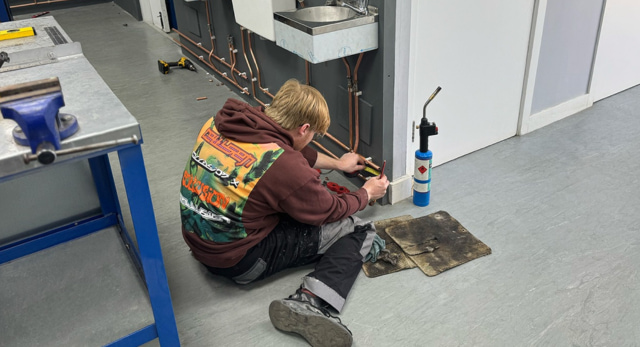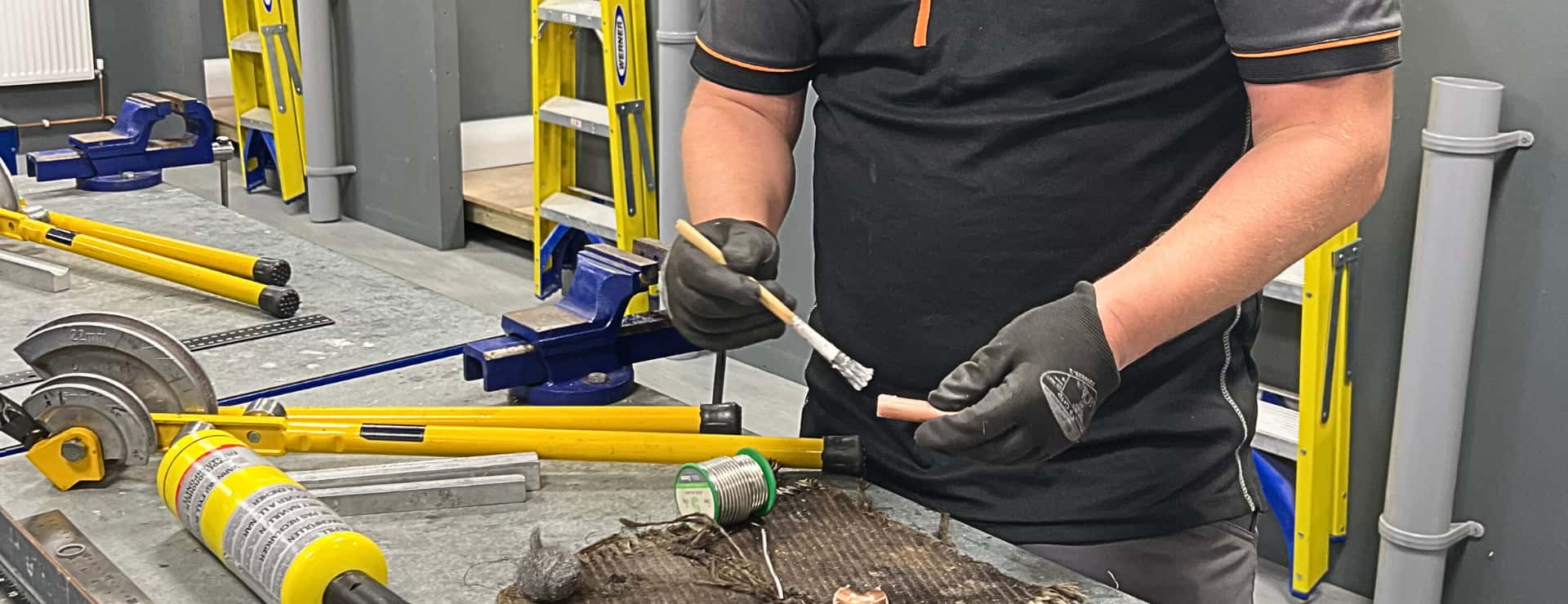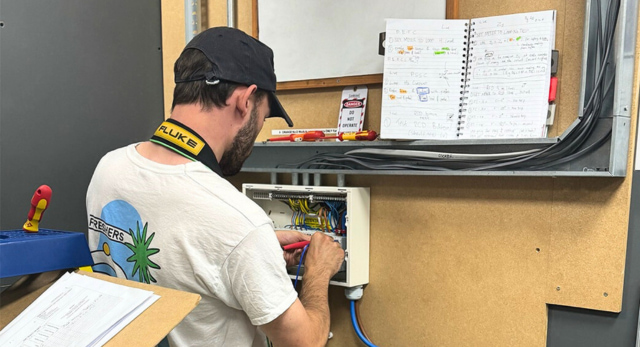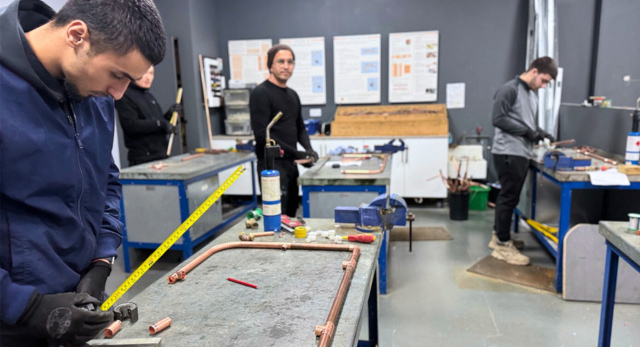Thinking about a career as a plumber? Whether you’re wondering “How hard can plumbing jobs be?”, how to get a job as a plumber, or what a plumber’s job actually involves, you’re in the right place. Plumbing is one of those trades that keeps Britain ticking and is always in demand. In this comprehensive insight, we’ll break down what plumber jobs are really like, how to get started, and why this could be the best move you ever make.
What Do Plumbers Do?
Plumbers are responsible for installing, maintaining, and repairing water, heating, and drainage systems. Their role is multi-faceted, requiring a mix of technical expertise, practical skills, and real-world problem-solving abilities. Each day is unique, ranging from fitting new bathrooms to tackling urgent repairs or sophisticated upgrades. They regularly collaborate with other trades, ensuring that homes, businesses, and wider communities function smoothly.
Below, the section is expanded to clearly explain the diverse areas of plumbing:
General Plumbing Jobs
Most plumbing jobs can be grouped into a few key categories that form the backbone of the profession. Whether working in a domestic, commercial, or specialist setting, plumbers spend the majority of their time handling installations, making urgent repairs, performing routine maintenance, and responding to emergency call-outs. Upgrading existing systems with modern, energy-efficient technology is increasingly common too. Together, these core tasks ensure homes, businesses, and wider communities continue to enjoy safe water supply, comfortable heating, and efficient drainage all year round.
While these categories apply across the industry, the specific nature of plumbing work varies depending on the setting. Below, we explore how the role differs across domestic, commercial, and renewable sectors, each of which presents its own unique challenges, skill requirements, and opportunities for plumbers.
Domestic Plumbing
Domestic plumbers work primarily in homes and residential properties. Their jobs include:
- Bathroom & Kitchen Installations: Fitting baths, showers, toilets, sinks, dishwashers, and washing machines.
- Hot Water Systems: Ensuring reliable access to hot water through the installation and repair of cylinders and immersion heaters.
- Water Pressure Problems: Diagnosing and fixing low or inconsistent water pressure.
- Leak Detection & Repair: Efficiently pinpointing and repairing leaks in floors, walls, or loft spaces.
- Unblocking Drains & Wastepipes: Clearing blockages to prevent flooding, bad odours, and health hazards.
- Heating Systems: Installing and maintaining central heating boilers, radiators, and underfloor heating. It is important to note that they must hold their CCN1 and CENWAT qualifications, as well as be Gas Safe Registered, to work on gas appliances such as boilers.
Domestic plumbers often work closely with homeowners, requiring excellent communication skills and a tidy, respectful approach to work within private spaces.
Commercial Plumbing
Commercial plumbers operate in environments such as office buildings, retail spaces, factories, schools, and healthcare facilities. Their remit includes:
- Large-scale Systems: Installing and maintaining complex water, heating, and drainage systems designed to serve many occupants.
- Booster Pumps & Water Tanks: Ensuring systems can cope with the high demand of commercial facilities.
- Industrial Pipework: Working with larger, more durable pipe materials (steel, copper) and advanced joining methods (e.g., welding).
- Legionella Prevention & Water Safety: Carrying out testing and ensuring compliance with regulations designed to protect public health.
- Maintenance Schedules: Performing regular, scheduled servicing to avoid costly business disruption.
- Emergency Response: Rapid call-outs for leaks, floods, and outages that could disrupt commercial operations or pose safety risks.
Commercial projects often demand strong organisational skills, the ability to read technical drawings, and coordination with project managers and other trades.
Renewable Plumbing
Plumbers specialising in renewable technologies help Britain transition to greener energy solutions. Their work involves:
- Heat Pumps: Installing and maintaining ground, air-source, and water-source heat pumps, which are increasingly popular for eco-friendly heating.
- Solar Thermal Systems: Fitting and servicing systems that use solar panels to heat water, reducing fossil fuel dependency.
- Rainwater Harvesting: Implementing systems that collect and utilise rainwater for flushing toilets, garden irrigation, and more.
- Greywater Recycling: Setting up systems to reuse water from baths, sinks, or appliances, cutting down on household mains and environmental impact.
- Smart Controls: Installing intelligent thermostats and monitoring equipment that optimise energy use and efficiency.
Plumbers in renewables must stay ahead of the latest green technology trends, government incentive schemes, and evolving regulations, helping customers save money and reduce carbon emissions.
Plumbers also work closely with other trades such as electricians, bricklayers, and gas engineers, especially on big projects. You can read more on plumbers’ common jobs & costs to see what some of our plumbing candidates’ days consist of.
Is Being a Plumber a Hard Job?
Being a plumber requires physical and mental demands, and this challenge gives the trade its reputation for toughness.
Physical Demands
- Cramped, awkward spaces: Plumbers often find themselves squeezed under sinks, behind toilets, in lofts, or crawling through tight spaces. Limited headroom, confined access, and awkward angles are par for the course.
- Heavy lifting and carrying: Whether it’s hoisting cast iron pipes or manoeuvring a bulky hot water cylinder, plumbers regularly lift and carry heavy materials and tools, sometimes repeatedly throughout the day.
- Climbing and balancing: Installing pipework often means climbing ladders or working at heights, such as running lines across ceilings or even on the outside of buildings.
- Prolonged standing and movement: Expect long hours on your feet, walking between jobs, and working on uneven terrain or ladders.
- Temperature extremes: From freezing attics in winter to sweltering crawl spaces in summer, plumbers work in all conditions.
- Repetitive motions: Tasks like tightening fittings, bending pipes, or cutting can lead to repetitive strain injuries if you’re not careful.
Gritty Reality
Some parts of the job are just plain messy. Blocked drains, leaking sewage, and water-damaged properties are all in a day’s work. You’ll need a strong stomach and a sense of humour to handle the less pleasant side of plumbing.
Unpredictable Work Environment
Unlike being in an office, plumbing jobs take plumbers to many different environments, private homes, commercial buildings, new builds, and sometimes even outdoors. Each site brings its own challenges, from poor lighting and tight deadlines to dealing with hazardous materials like asbestos or mould.
Being On Call
Plumbing emergencies don’t stick to a 9-to-5 schedule. Burst pipes, boiler breakdowns, and leaks can happen at any time, so plumbers are often on call for out-of-hours emergencies. This means late nights, early mornings, weekends, and sometimes even holidays.
Mental and Emotional Demands
- Problem-solving under pressure: Plumbing isn’t just about brawn, it’s about brains, too. Diagnosing issues, finding the right solutions, and thinking on your feet are all part of the job, especially when you’re dealing with emergencies.
- Dealing with stress: The pressure of urgent call-outs, tight deadlines, and sometimes demanding customers can take a toll on your mental well-being. Staying calm and focused under pressure is a must.
The Reward
Despite the hard graft, most plumbers will tell you the job is incredibly rewarding. There’s a real sense of achievement in solving problems and helping people out of a tight spot, especially during emergencies. The toughness of the job builds resilience, adaptability, and a sense of pride that comes from mastering a skilled trade.
If you’re looking for a job where you can stay active, solve real-world problems, and never have a dull day, plumbing might just be the perfect fit.
Is Being a Plumber a Good Job?
Absolutely! Here’s why:
- Job security: There’s always demand for skilled plumbers, water leaks and heating breakdowns don’t wait for a recession.
- Earning potential: The average plumber in Britain earns nearly £34,000 a year, with experienced plumbers making up to £46,000 or more.
- Variety: Every day brings new challenges and different environments.
- Independence: Many plumbers go on to run their own businesses, choosing their hours and clients.
- Job satisfaction: UK plumbers are regularly ranked among the happiest professionals in the country.
Of course, it’s not all sunshine and rainbows. There are tough days, but the rewards (both financial and personal) are significant.
What Qualifications Do You Need to Become a Plumber?
Depending on what type of career you want in plumbing, you can gain any of the following to become a plumber. Just keep in mind that the different qualifications have their own pros and cons.
- Level 2 or 3 Diploma in Plumbing and Heating
- NVQ Level 2 or 3 in Plumbing and Heating
- CSCS card for working on construction sites (learn more about a plumbing CSCS card)
- WRAS Water Regulations Certificate and other specialist qualifications for certain types of work
- For those who want to work with gas, an ACS CCN1 qualification can be gained after initial plumbing training.
These qualifications can be obtained through colleges, apprenticeships, or training providers like ourselves. To learn more, see our article “What qualifications do I need to be a plumber?“
How to Get a Job as a Plumber
Becoming a plumber in the UK is a flexible process, with several routes to suit different backgrounds, ages, and learning preferences. Whether you’re a school leaver, a career changer, or someone looking to upskill, there’s a pathway for you. Here’s a detailed look at how to get started and secure your first plumber job.
College Courses
One of the most common starting points is enrolling in a college course focused on plumbing or plumbing and domestic heating. These courses, such as the City & Guilds Level 2 Diploma in Plumbing Studies, provide a solid foundation in the trade. You’ll learn the basics of plumbing systems, health and safety, and practical installation skills. Many colleges also offer the T Level in Building Services Engineering for Construction, which blends classroom learning with industry placements, giving you a taste of real-world plumbing work.
Entry requirements for college courses vary, but you’ll usually need four or five GCSEs at grades 9 to 4 (A* to C), including English and maths, especially for T Levels. Completing a college course can make it easier to secure a trainee position with a plumbing company, as employers value candidates who already have some technical knowledge and hands-on experience.
Apprenticeships
Apprenticeships are a popular and highly respected route into the plumbing industry. A plumbing apprenticeship combines paid, on-the-job training with classroom-based study, typically over two to four years. You’ll work alongside experienced plumbers four days a week, with one day reserved for college or a specialist training centre. This approach gives you the chance to develop practical skills, earn a wage, and gain industry-recognised qualifications such as the NVQ Level 2 or Level 3 in Plumbing and Domestic Heating.
There are two main levels of plumbing apprenticeship:
- NVQ Level 2: Equivalent to five GCSE passes and suitable for those with some GCSEs, usually including English and maths.
- NVQ Level 3) Equivalent to two A Levels, requiring four or five GCSEs at grades 9 to 4 (A* to C), including English and maths.
Anyone over the age of 16 living in England can apply for an apprenticeship—there’s no upper age limit. Apprenticeships are managed by the National Apprenticeship Service, and you can find opportunities through online job boards, recruitment agencies, or by contacting employers directly.
A plumbing apprenticeship typically takes about four years to complete, allowing plenty of time to gain confidence and expertise. It’s also a cost-effective route, as you earn while you learn and don’t pay tuition fees.
Plumbing Courses
For those who want to train quickly, perhaps as an adult learner or career changer, plumbing courses are available through providers like ourselves. These intensive courses can get you job-ready in as little as six to ten weeks. They focus on practical skills and core plumbing knowledge, often leading to a recognised qualification such as the LCL Awards or City & Guilds Level 2 Diploma, with options to also achieve a plumbing NVQ.
Plumbing courses are ideal if you need to fit training around existing commitments, as many offer evening and weekend options. However, unlike apprenticeships, these courses are usually self-funded and don’t provide the same depth of workplace experience, so gaining additional on-the-job training or shadowing a qualified plumber is highly recommended.
On-the-Job Training
Another route into plumbing is starting as a plumber’s assistant or ‘mate’. This entry-level position allows you to work alongside experienced plumbers, learning the trade directly on-site. Over time, you’ll pick up practical skills, industry knowledge, and an understanding of the tools and materials used in the job. Some employers may even support you in gaining formal qualifications while you work.
This route is particularly suitable for those who may not have the academic qualifications for college or apprenticeships but have good practical skills and a strong work ethic. It’s also a great way to gain valuable work experience and build a network of industry contacts.
Direct Application
If you already have relevant experience or qualifications from related industries, such as heating, ventilation, or other building services, you may be able to apply directly for trainee plumber roles. Some employers offer in-house training programmes or support further study to help you become fully qualified. The Armed Forces, for example, provide plumbing training as part of their engineering roles, which can be a unique and rewarding way to enter the trade.
Work Experience and Volunteering
Gaining relevant work experience, even on a voluntary basis, can be a huge asset when applying for plumber jobs. Look for opportunities to shadow a plumber, assist on community projects, or take part in taster courses. This hands-on exposure not only builds your confidence but also demonstrates your commitment to potential employers.
Finding Plumbing Jobs
Once you’re trained and qualified, finding your first plumber job is about showcasing your skills, enthusiasm, and willingness to learn. Update your CV to highlight your training, qualifications, and any work experience. Register with job boards, approach local plumbing firms, and network through industry events or online forums. Don’t overlook the value of word-of-mouth. Many plumbing jobs are filled through recommendations and referrals. Additionally, a good way to find plumbing jobs is via websites such as Reed, Book A Builder, Indeed or Jobsite.
If you’ve completed your training with Logic4training, take advantage of our career support, which includes CV workshops, interview preparation, and introductions to employers.
What Is the Job Description of a Plumber?
Indeed lists a plumber job description as:
“A Plumber, or Pipefitter, is someone who fixes broken pipes and drains, installs pipework into new construction and retrofits or upgrades existing plumbing. Their duties include measuring and cutting pipe to length, welding joins for a leak-free junction and using the correct type of pipe and material for the job at hand.”
Key skills:
- Technical know-how and practical skills
- Problem-solving and attention to detail
- Good communication (for dealing with clients and other trades)
- Physical fitness and stamina
- Ability to work independently and as part of a team
What Is a Plumber’s Job Like Day-to-Day?
A plumber’s day is anything but predictable, and that’s exactly what keeps the job interesting. Most plumbers start their day early, often before sunrise, because plumbing is rarely a nine-to-five gig. Early starts are common, especially for domestic plumbing jobs where homeowners need issues sorted before heading off to work, or for commercial sites that want to minimise disruption to their business hours. For those offering emergency services, the day can begin even earlier, with urgent call-outs sometimes coming in during the middle of the night for things like burst pipes or major leaks.
Once the van is loaded with the day’s tools and materials, plumbers hit the road. Travelling between plumbing jobs is a big part of the role, whether it’s zipping across town to fix a leaky radiator in a flat, or heading out to a building site for a large installation. The variety of locations, from tiny one-bedroom flats to sprawling office complexes, means plumbers need to be adaptable and ready for anything.
On arrival at a job, the first task is usually to diagnose the problem. This could be as simple as a dripping tap or as complex as a full-blown system failure. Plumbers need a keen eye and sharp problem-solving skills to quickly identify the root cause and decide on the best fix. Some days are filled with routine maintenance, like checking boilers, inspecting pipework, or servicing water heaters. On other days, the focus might be on major installations, fitting new bathrooms, kitchens, or even entire heating systems.
Paperwork is an unavoidable part of the job. Plumbers often need to prepare quotes, order parts, and keep detailed records of work completed. They also spend a fair amount of time talking to customers, explaining issues in plain English, offering advice, and making sure clients understand the work being done. Good people skills are essential; plumbers are not just problem-solvers, but also trusted advisors in the eyes of their customers.
The day rarely follows a strict schedule. Plumbing jobs can overrun, emergencies can crop up unexpectedly, and travel time between sites can eat into the day. Lunch is often grabbed on the go, and flexibility is key. For self-employed plumbers, there’s the added responsibility of managing bookings, sourcing materials, and handling invoices, but also the freedom to choose which jobs to take and when to work.
Sometimes, the day doesn’t end when the sun goes down. Plumbers offering emergency services might be called out in the evening or at weekends to deal with urgent issues like floods or heating breakdowns. The ability to stay calm under pressure and work efficiently in high-stress situations is crucial.
In short, a plumber’s day is dynamic, hands-on, and packed with variety. It requires organisation, adaptability, and a genuine desire to help people. For those who thrive on new challenges and enjoy practical problem-solving, no two days are ever the same and that’s what makes plumber jobs so rewarding.
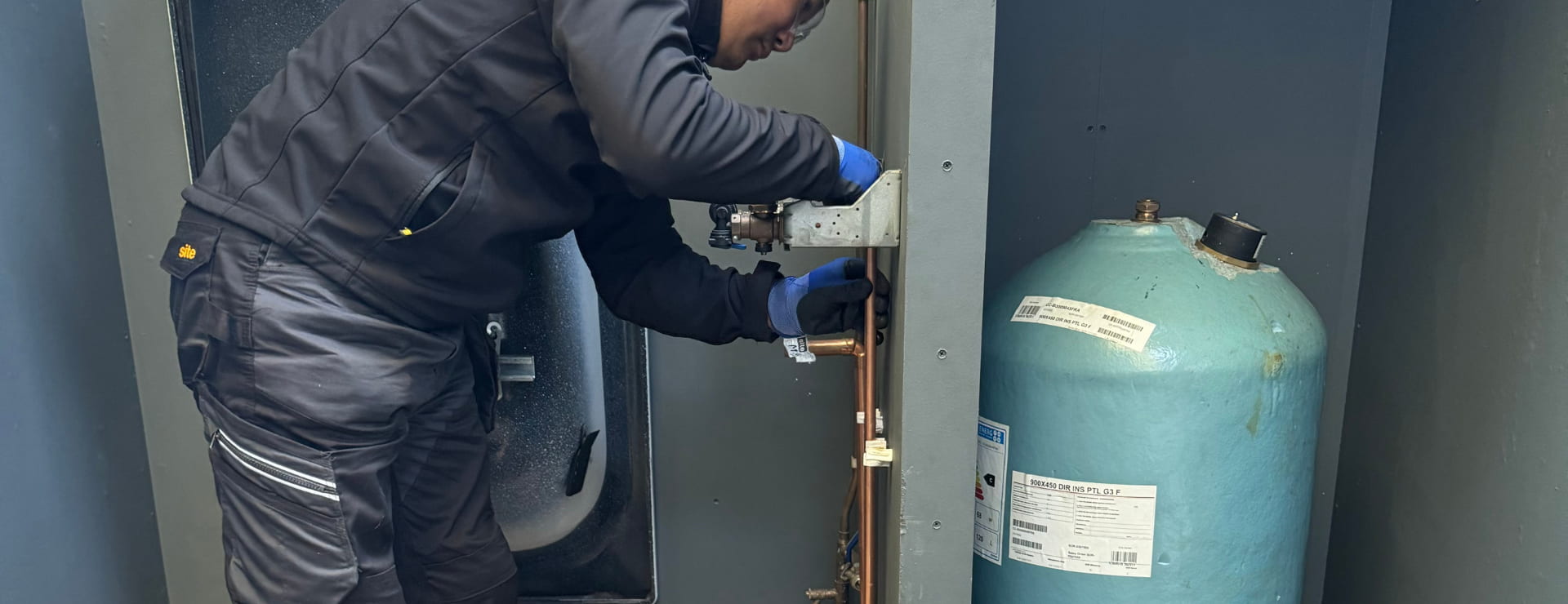
Career Progression
Once you’ve got your foot in the door, there are loads of ways to specialise or move up:
- Commercial plumbing: Larger, more complex systems in offices, factories, and public buildings.
- Gas engineering: Working with boilers and gas appliances (requires Gas Safe registration).
- Renewable energy: Installing heat pumps, solar thermal systems, and other green tech.
- Self-employment: Many plumbers set up their own businesses, taking control of their workload and earnings.
- Supervisory or teaching roles: With experience, you could move into management or training the next generation of plumbers.
Check out Logic4training’s advanced plumbing and heating courses for upskilling opportunities.
Plumbing Training with Logic4training
- Over 22 years’ experience in building services training
- Small class sizes and expert trainers
- Hands-on, practical learning with real-world scenarios
- Flexible courses for new entrants and career changers (including weekends)
- Support with job applications and starting your own business
- Excellent reviews and testimonials from successful students
Don’t just take our word for it, see what our students have to say about their experience on our plumbing courses review article.
Is Plumbing Right for You?
If you’re practical, enjoy solving problems, and want a job that’s always in demand, plumbing could be the perfect fit. It’s not always glamorous, but it’s rewarding, well-paid, and offers real independence.
Ready to take the plunge?
Explore our plumbing courses or read more about how much plumbers earn if you want to learn more about a plumber’s earning potential.
FAQs
How long does it take to become a qualified plumber?
It typically takes between two and four years to become fully qualified, depending on your route. Apprenticeships usually last around four years, combining on-the-job experience with study. Fast-track courses can get you job-ready in as little as six to ten weeks, but you’ll still need to gain practical experience to progress to higher qualifications and more complex work.
Do plumbers need to be licensed or registered in the UK?
While there is no single national plumbing licence in the UK, you’ll need to hold recognised qualifications such as an NVQ Level 2 or 3 to work independently. If you want to work with gas appliances, you must be Gas Safe registered. For site work, a CSCS card is usually required. Joining professional bodies like the Chartered Institute of Plumbing and Heating Engineering (CIPHE) can also enhance your credibility.
What skills and qualities make a good plumber?
A good plumber is practical, physically fit, and has strong problem-solving skills. Plumbing jobs require plumbers to have great attention to detail, patience, and the ability to work independently. Good communication skills are important for dealing with customers and other trades. Adaptability and a willingness to keep learning new techniques and regulations will help you progress in your career.
Can I become a plumber later in life or as a career changer?
Absolutely. Many people retrain as plumbers in their 30s, 40s, or even later. Fast-track and flexible training options are available for adults, and your previous work experience, even in unrelated fields, can be valuable, especially if it’s in customer service, construction, or project management.
How do I find my first plumbing job?
Start by updating your CV to highlight your qualifications, practical experience, and any work placements. Register with job boards, approach local plumbing firms, and network through industry events or online forums. Many training providers, including Logic4training, offer career support services such as CV workshops and introductions to employers to help you secure a number of plumbing jobs.
What are the typical working hours for a plumber?
Most plumbers work between 37 and 42 hours per week, but hours can be irregular, especially if you offer emergency call-out services. Evening, weekend, and bank holiday work is common, particularly for self-employed plumbers or those working for companies with 24/7 cover.
